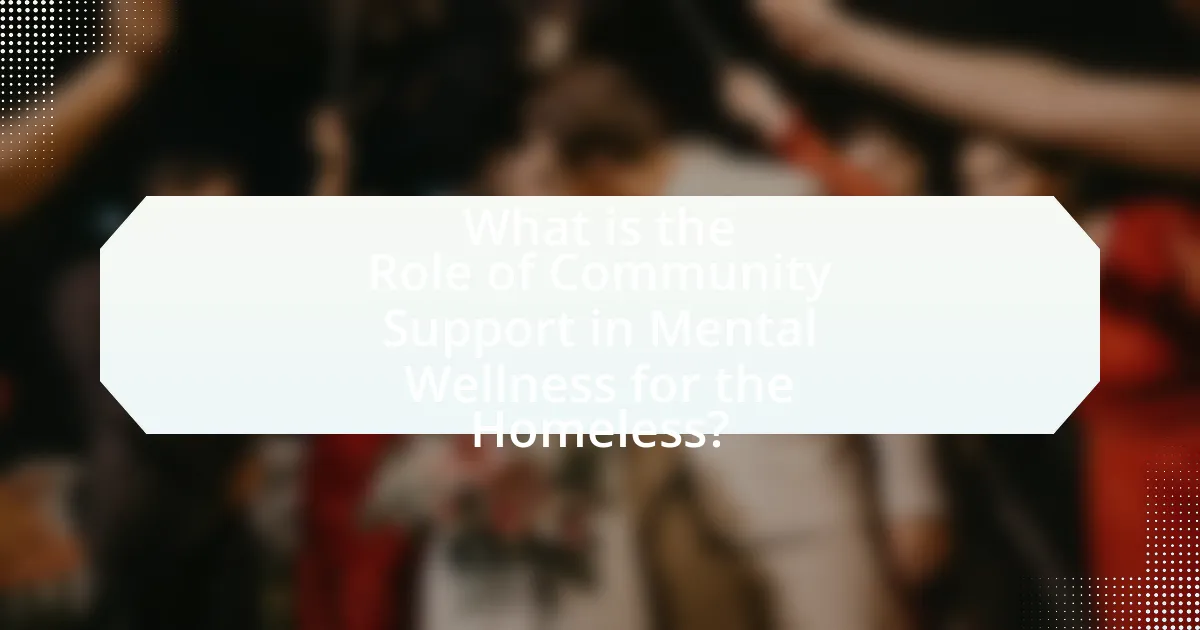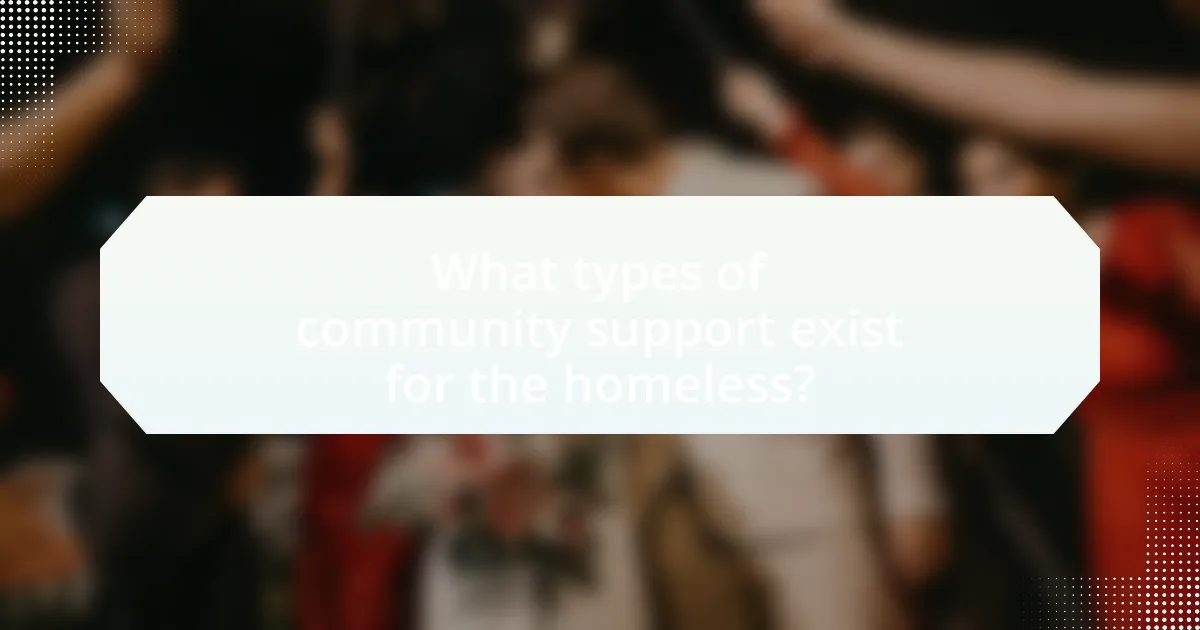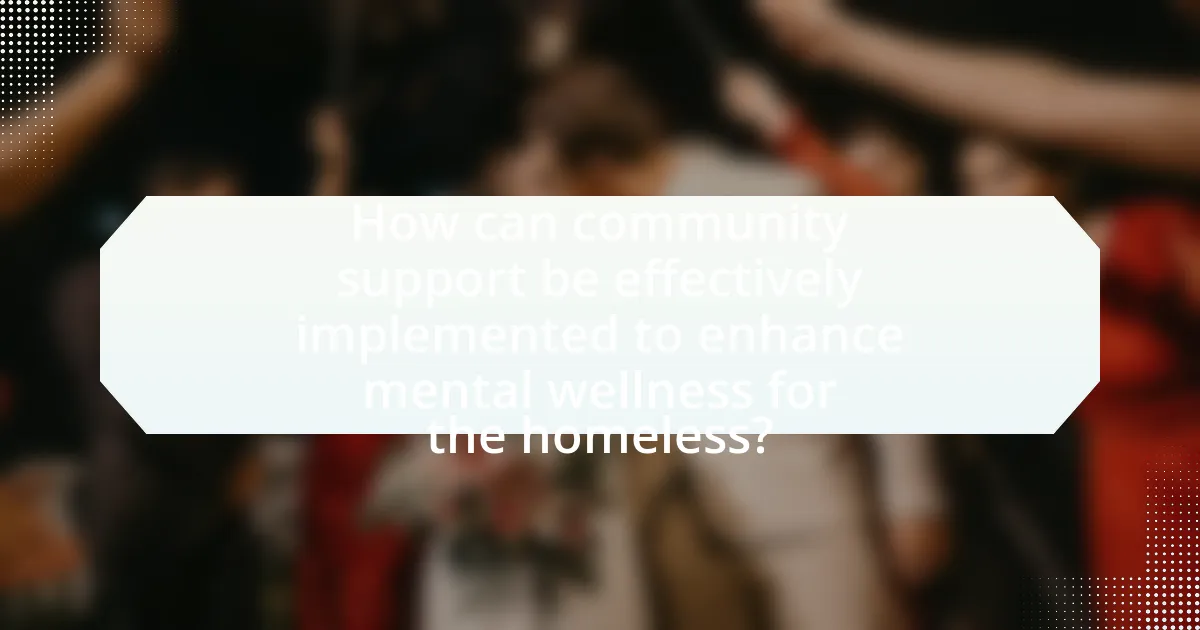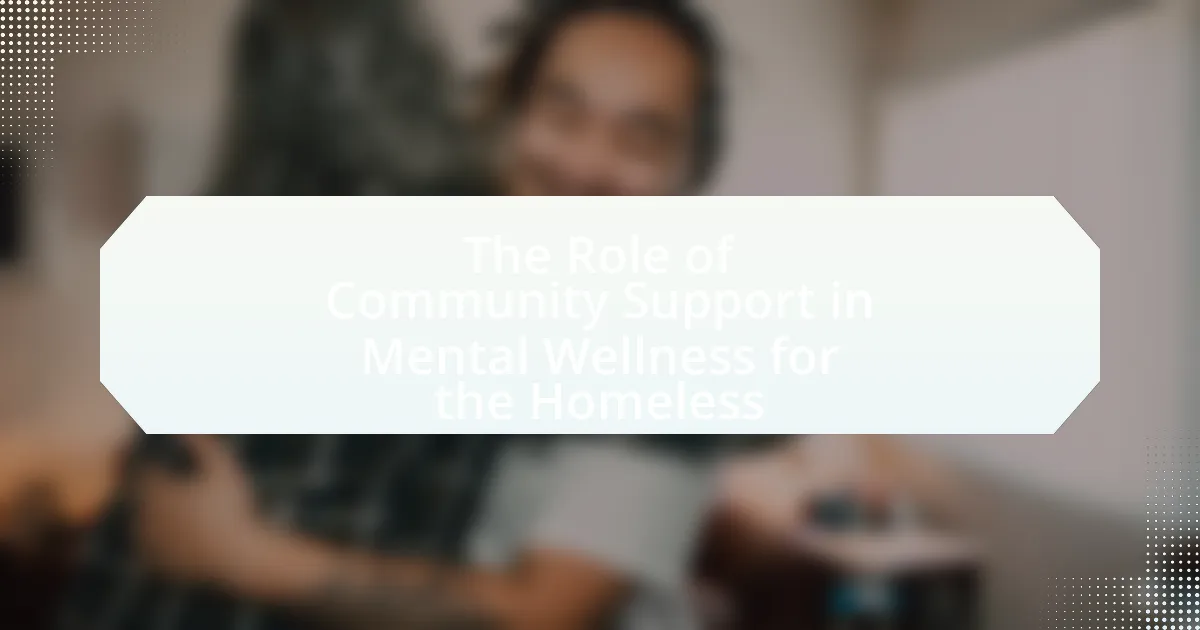The article examines the critical role of community support in enhancing mental wellness for the homeless population. It highlights how essential resources, social connections, and emotional support from community initiatives can alleviate feelings of isolation and improve psychological outcomes. Key components such as access to mental health services, peer support groups, and stable housing are discussed, along with their synergistic effects on mental health. The article also addresses common mental health challenges faced by the homeless, the impact of mental wellness on overall quality of life, and effective strategies for implementing community support systems to foster resilience and recovery.

What is the Role of Community Support in Mental Wellness for the Homeless?
Community support plays a crucial role in enhancing mental wellness for the homeless by providing essential resources, social connections, and emotional support. Research indicates that individuals experiencing homelessness often face isolation, which exacerbates mental health issues; community support initiatives, such as outreach programs and peer support groups, can significantly reduce feelings of loneliness and despair. For instance, a study published in the American Journal of Public Health found that access to community resources, including mental health services and social networks, leads to improved psychological outcomes for homeless individuals. This evidence underscores the importance of community involvement in fostering resilience and promoting mental health among the homeless population.
How does community support influence mental wellness among the homeless population?
Community support significantly enhances mental wellness among the homeless population by providing essential resources, social connections, and emotional stability. Research indicates that individuals experiencing homelessness who engage with supportive community networks report lower levels of anxiety and depression. For instance, a study published in the American Journal of Public Health found that access to community services, such as mental health counseling and peer support groups, correlates with improved psychological outcomes for homeless individuals. Furthermore, community support fosters a sense of belonging and reduces feelings of isolation, which are critical factors in mental health.
What are the key components of community support that aid mental wellness?
Key components of community support that aid mental wellness include social connections, access to resources, and emotional support. Social connections foster a sense of belonging and reduce feelings of isolation, which is crucial for mental health. Access to resources, such as healthcare, housing, and employment services, provides individuals with the tools necessary to improve their circumstances and mental well-being. Emotional support from peers and community members offers validation and encouragement, which can significantly enhance resilience and coping strategies. Research indicates that communities with strong social networks and support systems experience lower rates of mental health issues, highlighting the importance of these components in promoting mental wellness.
How do these components interact to improve mental health outcomes?
Community support components, such as social networks, access to resources, and mental health services, interact synergistically to improve mental health outcomes for the homeless. Social networks provide emotional support and reduce feelings of isolation, which are critical for mental well-being. Access to resources, including food, shelter, and healthcare, addresses basic needs that can alleviate stress and anxiety, creating a foundation for better mental health. Additionally, mental health services offer professional support and treatment options, which are essential for managing mental health conditions. Research indicates that integrated community support systems can lead to a 30% reduction in symptoms of depression among homeless individuals, demonstrating the effectiveness of these interactions in enhancing mental health outcomes.
Why is mental wellness crucial for the homeless community?
Mental wellness is crucial for the homeless community because it directly impacts their ability to secure stable housing, access healthcare, and reintegrate into society. Individuals experiencing homelessness often face high levels of stress, trauma, and mental health disorders, which can exacerbate their situation and hinder their recovery. According to the National Alliance to End Homelessness, approximately 25% of homeless individuals suffer from severe mental illness, making mental health support essential for breaking the cycle of homelessness. Addressing mental wellness not only improves individual outcomes but also fosters community stability and reduces overall societal costs associated with homelessness.
What are the common mental health challenges faced by the homeless?
Common mental health challenges faced by the homeless include depression, anxiety, post-traumatic stress disorder (PTSD), and substance use disorders. These issues often stem from the traumatic experiences associated with homelessness, such as violence, loss of social support, and chronic stress. Research indicates that approximately 30% of homeless individuals experience serious mental illness, highlighting the prevalence of these challenges. Additionally, the National Coalition for the Homeless reports that mental health issues can exacerbate the difficulties of securing stable housing, creating a cycle that is hard to break.
How does mental wellness impact overall quality of life for the homeless?
Mental wellness significantly enhances the overall quality of life for the homeless by improving their emotional stability, social interactions, and ability to access resources. When individuals experiencing homelessness maintain good mental health, they are more likely to engage in positive behaviors, such as seeking employment, forming supportive relationships, and adhering to treatment plans for physical health issues. Research indicates that mental health disorders, such as depression and anxiety, can exacerbate the challenges of homelessness, leading to a cycle of poverty and social isolation. For instance, a study published in the American Journal of Public Health found that individuals with untreated mental health conditions are more likely to experience prolonged homelessness, which further deteriorates their mental and physical health. Thus, addressing mental wellness through community support initiatives can lead to improved life satisfaction and stability for homeless individuals.

What types of community support exist for the homeless?
Various types of community support exist for the homeless, including emergency shelters, food assistance programs, mental health services, and job training initiatives. Emergency shelters provide immediate housing and safety, while food assistance programs ensure access to nutritious meals. Mental health services, often offered through community organizations, address psychological needs and promote overall well-being. Job training initiatives equip individuals with skills necessary for employment, facilitating long-term stability. According to the National Alliance to End Homelessness, these support systems are crucial in reducing homelessness and improving mental wellness among affected individuals.
How do different forms of community support address mental wellness?
Different forms of community support address mental wellness by providing essential resources, social connections, and emotional assistance that foster resilience and recovery. For instance, peer support groups enable individuals to share experiences and coping strategies, which has been shown to reduce feelings of isolation and improve mental health outcomes. Research indicates that community-based interventions, such as outreach programs and mental health services, can lead to a 30% decrease in symptoms of depression among participants. Additionally, access to stable housing and employment support through community organizations significantly enhances mental wellness by providing individuals with a sense of stability and purpose. These forms of support collectively contribute to improved mental health for homeless individuals, demonstrating the critical role of community in addressing mental wellness.
What role do shelters and housing programs play in mental health support?
Shelters and housing programs play a critical role in mental health support by providing stable living conditions that reduce stress and promote well-being. These programs offer a safe environment, which is essential for individuals experiencing homelessness, as instability can exacerbate mental health issues. Research indicates that access to stable housing significantly improves mental health outcomes; for instance, a study published in the American Journal of Public Health found that individuals who were provided with stable housing experienced a 50% reduction in psychiatric symptoms. Additionally, shelters often connect residents with mental health services, facilitating access to counseling and support groups, which further enhances their mental health recovery.
How do peer support groups contribute to mental wellness?
Peer support groups contribute to mental wellness by providing a sense of belonging and shared experience among individuals facing similar challenges. These groups facilitate open communication, allowing members to share their feelings and coping strategies, which can reduce feelings of isolation and stigma. Research indicates that participation in peer support groups can lead to improved emotional well-being, as evidenced by a study published in the Journal of Community Psychology, which found that individuals involved in peer support reported lower levels of depression and anxiety. Additionally, peer support groups often empower members by fostering resilience and encouraging personal growth, further enhancing mental wellness.
What are the benefits of community involvement in supporting the homeless?
Community involvement in supporting the homeless enhances mental wellness by fostering social connections and providing essential resources. Engaging local residents in initiatives such as food drives, shelter volunteering, and advocacy creates a sense of belonging for homeless individuals, which is crucial for their mental health. Research indicates that social support significantly reduces feelings of isolation and depression among homeless populations. For instance, a study published in the American Journal of Public Health found that community engagement initiatives led to a 30% increase in reported mental well-being among participants. Additionally, community involvement can lead to increased funding and resources for mental health services, further benefiting the homeless.
How does volunteer engagement enhance mental health services for the homeless?
Volunteer engagement enhances mental health services for the homeless by providing essential support, resources, and human connection that improve service delivery and outcomes. Volunteers often bring diverse skills and perspectives, which can help tailor mental health interventions to better meet the unique needs of homeless individuals. For instance, studies have shown that programs involving volunteers can lead to increased access to mental health services, as volunteers often assist in outreach efforts, helping to bridge the gap between service providers and the homeless population. Additionally, the presence of volunteers fosters a sense of community and belonging, which is crucial for mental wellness, as social support has been linked to improved mental health outcomes. Research indicates that individuals experiencing homelessness who engage with volunteers report higher levels of emotional support and lower levels of depression, demonstrating the positive impact of volunteer involvement in mental health services.
What impact does community awareness have on reducing stigma around homelessness and mental health?
Community awareness significantly reduces stigma around homelessness and mental health by fostering understanding and empathy within society. When communities engage in educational initiatives, such as workshops and outreach programs, they provide accurate information about the challenges faced by homeless individuals and those with mental health issues. Research indicates that increased awareness leads to more positive attitudes and behaviors towards these populations, as evidenced by a study published in the Journal of Community Psychology, which found that community education programs can decrease stigma by up to 30%. This reduction in stigma encourages supportive interactions and increases access to resources, ultimately promoting mental wellness among the homeless.

How can community support be effectively implemented to enhance mental wellness for the homeless?
Community support can be effectively implemented to enhance mental wellness for the homeless by establishing comprehensive outreach programs that provide access to mental health services, social support networks, and stable housing options. These outreach programs can include mobile clinics that offer psychological counseling, peer support groups that foster community connections, and partnerships with local organizations to facilitate job training and employment opportunities. Research indicates that integrated support systems, such as those provided by the National Alliance to End Homelessness, can significantly improve mental health outcomes by addressing both immediate needs and long-term stability. By creating a collaborative environment where mental health resources are readily available and accessible, communities can effectively contribute to the overall mental wellness of homeless individuals.
What strategies can communities adopt to provide better support?
Communities can adopt strategies such as establishing comprehensive outreach programs, creating safe spaces for dialogue, and providing access to mental health resources to better support the homeless. Outreach programs can connect individuals with essential services, including housing, healthcare, and employment opportunities, which are critical for mental wellness. Safe spaces foster trust and encourage open communication, allowing homeless individuals to share their experiences and seek help without stigma. Access to mental health resources, including counseling and support groups, is vital; studies show that integrated mental health services can significantly improve outcomes for homeless populations, as evidenced by the success of programs like the Housing First model, which has reduced homelessness and improved mental health in various cities.
How can local organizations collaborate to create comprehensive support systems?
Local organizations can collaborate to create comprehensive support systems by establishing partnerships that integrate services, share resources, and coordinate efforts to address the multifaceted needs of the homeless population. For instance, organizations can form coalitions that include shelters, mental health services, healthcare providers, and job training programs, allowing them to provide holistic support. Research indicates that coordinated care models, such as those implemented in cities like San Francisco, have led to improved outcomes for homeless individuals by reducing service duplication and enhancing access to necessary resources. By leveraging each organization’s strengths and expertise, local entities can create a more effective and responsive support network that addresses both immediate needs and long-term mental wellness for the homeless.
What role does funding play in sustaining community support initiatives?
Funding is essential for sustaining community support initiatives, as it provides the necessary resources to implement and maintain programs that address mental wellness for the homeless. Without adequate financial backing, initiatives struggle to offer consistent services, hire qualified staff, and secure facilities, which are critical for effective support. For instance, a study by the National Alliance to End Homelessness highlights that programs with stable funding are more likely to achieve long-term success in reducing homelessness and improving mental health outcomes. This demonstrates that funding directly influences the capacity and effectiveness of community support initiatives aimed at enhancing mental wellness for vulnerable populations.
What are some best practices for fostering community support for mental wellness among the homeless?
Best practices for fostering community support for mental wellness among the homeless include establishing accessible mental health services, promoting awareness and education about mental health issues, and creating supportive community networks. Accessible mental health services, such as mobile clinics and outreach programs, ensure that homeless individuals receive timely care. Studies show that communities with integrated mental health services see improved outcomes for homeless populations. Promoting awareness through community workshops and training helps reduce stigma and encourages empathy, leading to increased community involvement. Additionally, creating supportive networks, such as peer support groups and volunteer programs, fosters a sense of belonging and connection, which is crucial for mental wellness. Research indicates that social support significantly enhances mental health outcomes, making these practices essential for effective community support.
How can community members be educated about the needs of the homeless?
Community members can be educated about the needs of the homeless through targeted outreach programs and awareness campaigns. These initiatives can include workshops, seminars, and informational sessions that provide insights into the challenges faced by homeless individuals, such as mental health issues, lack of access to healthcare, and social stigma. Research indicates that community education efforts, like those implemented by organizations such as the National Alliance to End Homelessness, have successfully increased public understanding and empathy towards homeless populations. By utilizing data-driven approaches and personal stories, these educational programs can foster a more informed and compassionate community response to homelessness.
What are effective ways to measure the impact of community support on mental wellness?
Effective ways to measure the impact of community support on mental wellness include quantitative surveys, qualitative interviews, and mental health assessments. Quantitative surveys can utilize standardized scales, such as the Warwick-Edinburgh Mental Well-being Scale, to gather data on individuals’ mental health before and after receiving community support. Qualitative interviews provide in-depth insights into personal experiences and perceived changes in mental wellness due to community engagement. Mental health assessments, conducted by professionals, can track changes in symptoms and overall mental health status over time. Research indicates that community support significantly correlates with improved mental health outcomes, as evidenced by a study published in the Journal of Community Psychology, which found that individuals with strong community ties reported lower levels of depression and anxiety.

Leave a Reply